Virtual reality, commonly known as VR, is advanced technology that simulates a realistic and immersive experience through computer-generated environments. VR users put on headsets or glasses, then interact with these simulated worlds and feel like they are actually present in them.
VR has opened up all sorts of new possibilities for users to interact with content. Like any tool, however, the power of VR also presents risks — especially to kids who may not be ready to be fully immersed in a virtual environment with different rules and expectations than the real world.
One of the most popular VR tools available today is Oculus so let’s take a look at what is and what parents should know about it.
What is Oculus? Is it Safe for Kids?
Oculus gaming headsets (owned by Meta Platforms i.e. Facebook), are stand-alone, wireless devices that run virtual reality (VR) games and software on Android.
Players can watch videos and movies, play games, and browse the web. Your kids will enter another world once they pop on the VR goggles. Like other gaming device such Xbox or Nintendo Switch, Oculus houses a host of games and platforms for users to play. Using an Oculus, you could play Beat Saber, a single-player game similar to GuitarHero, or chat with friends or strangers on VRChat.
Due to the vast variety of available games and apps, Oculus’s safety depends mostly on which games kids are allowed to download and play. But given that the system’s biggest draw is the ability to meet and interact with friends and strangers alike, Oculus is inherently dangerous for kids in some ways.
Oculus Dangers
VR may seem exciting and innovative, but it presents serious threats to children.
Specifically, there are few controls, limited child protections, and weak age restrictions.
One Oculus tagline claims, “Do Just About Anything With Anyone—From Anywhere”. While this describes the online community-building capabilities of the devices, it shows that child safety is clearly not the top priority.
Weak age restrictions
VR headsets vary in age requirements, but Oculus recommends theirs for kids 13 and up. However, this is precisely the age range that predators target for grooming.
Studies show that children ages 12-15 are particularly vulnerable to predatory manipulation.
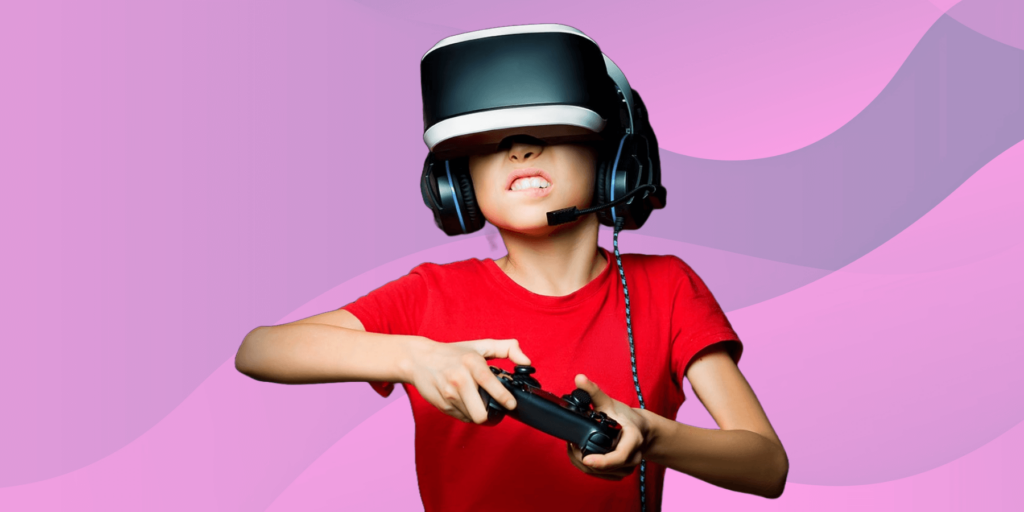
Furthermore, children may lie about their age, and we know that predators frequently assume younger identities to target their victims.
Dangerous Game Features
Many VR games include built-in features that put our kids at risk, namely multiplayer and in-game chatting.
Multiplayer options
Simply put, the multiplayer option can be dangerous for children.
While entertaining, challenging, and fast-paced, gaming with others can allow kids to meet dozens of strangers online—which can lead to school struggles, violent behavior, or more serious mental health concerns.
The most common types of multiplayer games are:
- Player vs. Player: Games focused on 1:1 competition
- Co-op: Player and 1-3 teammates work together toward the same objective
- Team MP: Games focused on team vs. team competition
- Massive MP: Players compete individually or on a team in online servers
- Asymmetrical MP: Local players can join a unified game across various types of devices
In-game chats
Digital anonymity can encourage people to behave more aggressively than they would in person.
As multiplayer games are collaborative and competitive, they often come with chat features that might expose children to inappropriate language, toxic behaviors, bullying, and grooming.
More than a third of children 8-17 played with people they didn’t know (36%); overall, 16% of 8-17s chatted to people they didn’t know via the messaging /chat functions in games.
—(Ofcom, 2022)
Some game chat systems keep it family-friendly by censoring and moderating users, but this is not always the case.
Hazardous Platform Features
Oculus also has inherent features that increase the risk for kids.
Messenger
Because Oculus players can access Messenger with a Facebook login, kids can chat with those they have friended using text messages, voice calls, or video calls.
This could be dangerous if a child accepts Facebook friend requests from strangers—especially people they meet through VR.
They can chat while using the Oculus headset and then continue conversations on their phone through the Messenger app. To reduce risk, this option can be disabled.
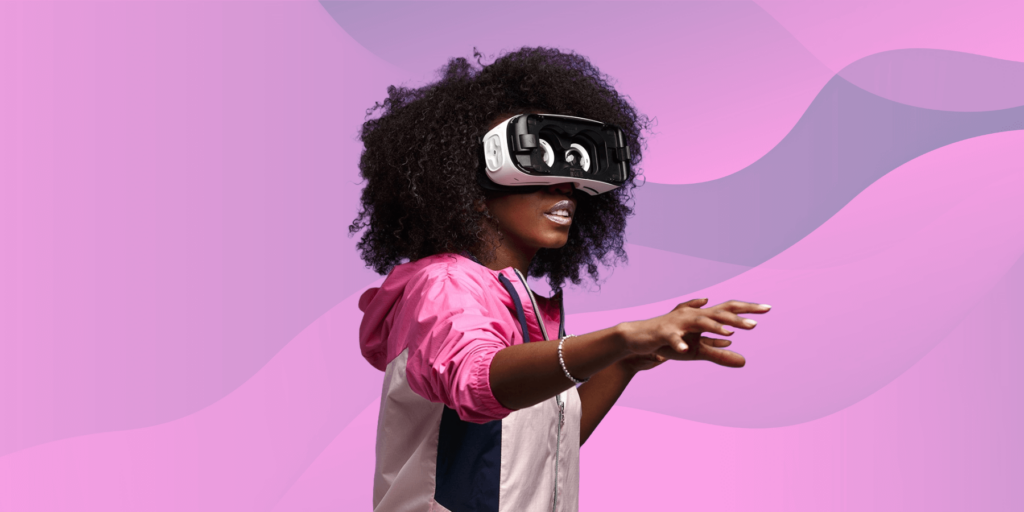
Parties
Using this feature, adolescents can create virtual “parties” with fellow VR Facebook friends.
A party is basically a group voice call that allows anyone to create or continue a conversation while playing a game together.
Parties can be private—with contacts you’re already friends with or public—open to anyone in VR.
The potential danger lies in private friends inviting other party guests your child doesn’t know or strangers joining a child’s party without an invitation. User settings determine how parties can be joined.
20 Unsafe Games on Oculus
As discussed, three elements make certain VR games more dangerous than others—an online format, multiplayer capabilities, and chat options.
The following list highlights available Oculus Quest 2 game titles that match this profile.
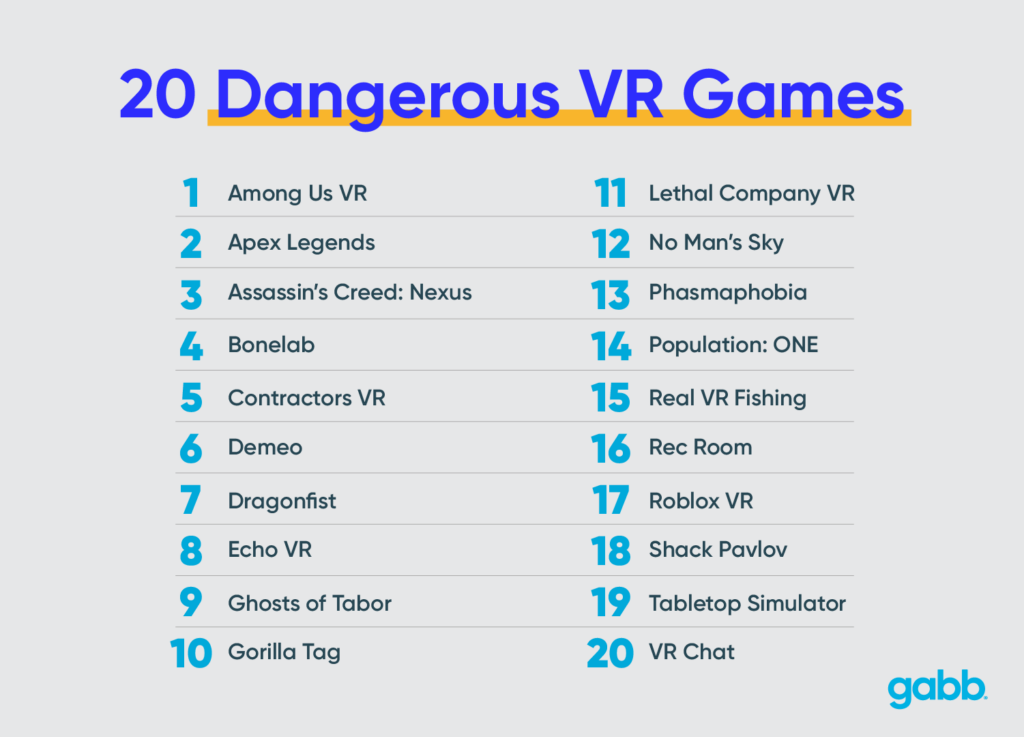
Can You Chat with Strangers on Oculus?
Yes. Despite being designed to elevate the player experience through strategizing with teammates, gaming chat systems have normalized talking to strangers online.
This often occurs through direct messaging, phone conversations, digital party interactions, and speaking to strangers in real time.

Simply put, these features make it easier for predators to groom children by using abusive methods like establishing emotional connections or moving in-game chats to outside platforms. One app that parents should be aware of is VRChat.
Is VRChat Dangerous for Kids?
Yes. VRChat is a VR app and anyone with an Oculus and a Facebook account can download VRChat for free. Since children will likely link to their other social media accounts from this Facebook account, most will inadvertently or intentionally share personal details (Lenhart & Madden, 2020).
VRChat Parental Controls
Recently, VRChat introduced an age verification feature. Now, kids under 13 are not allowed to play, and kids between 13 and 17 need parental permission to play. All kids under 18 are automatically given a content filter for dangerous and inappropriate content.
Once the age is set on Oculus, it can’t be changed. So if your child makes a Facebook account with the correct age, the parental controls will kick in automatically. However, the inability to change the age on the Oculus profile can be dangerous when children lie about their age — a remarkably easy task.
Other parental controls include blocking chats and calls through Facebook (which does not extend to 3rd party messaging apps), blocking developer mode, and monitoring notifications. These parental controls seem to have many vulnerable points where kids can work around them, and they may not be very reliable in preventing dangerous content or interactions from appearing on Oculus. Parents should still be careful when assessing the risks of Oculus.
Children between the ages of 12 and 15 are especially susceptible to being groomed or manipulated by adults they meet online.
—Child Crime Prevention & Safety Center
Solutions to Protect Kids: Safety Measures
Moving Safely Forward
Despite existing limitations, there are some things you can do right now to take care of your family while still enjoying the VR experience.
VR risks are abundant, but take heart! By understanding the platform, staying aware, and talking with our kids, parents can ensure a safer, more rewarding VR experience for everyone.
Whether it’s VR or another type of device, consider a tech in steps approach that takes your child’s individual level of maturity into account. It’s impossible to do an accurate assessment of pros and cons without considering the specifics of your own family situation.
Did we miss anything? Let us know in the comments!
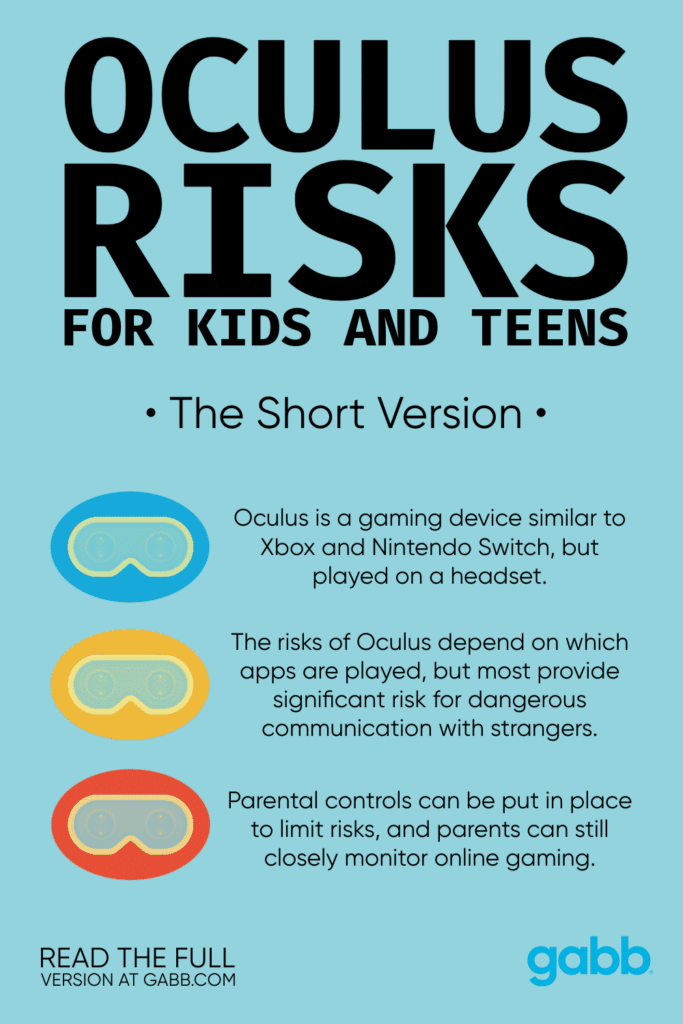





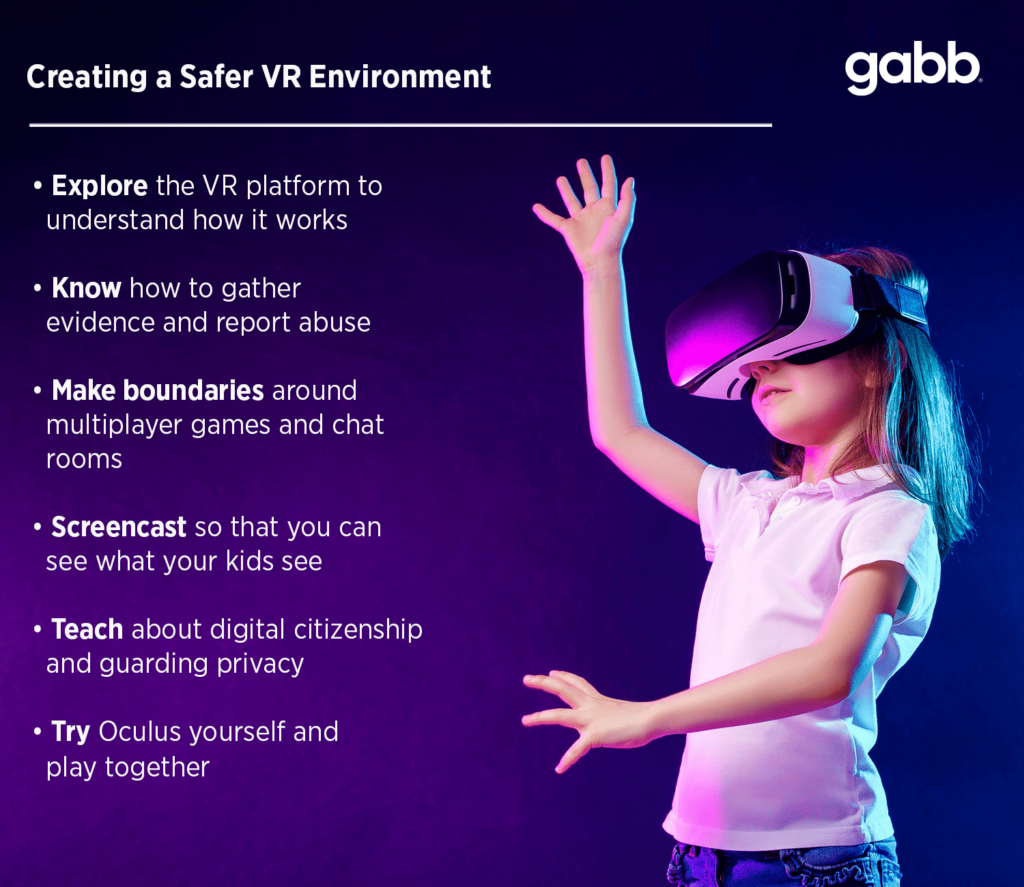




Success!
Your comment has been submitted for review! We will notify you when it has been approved and posted!
Thank you!